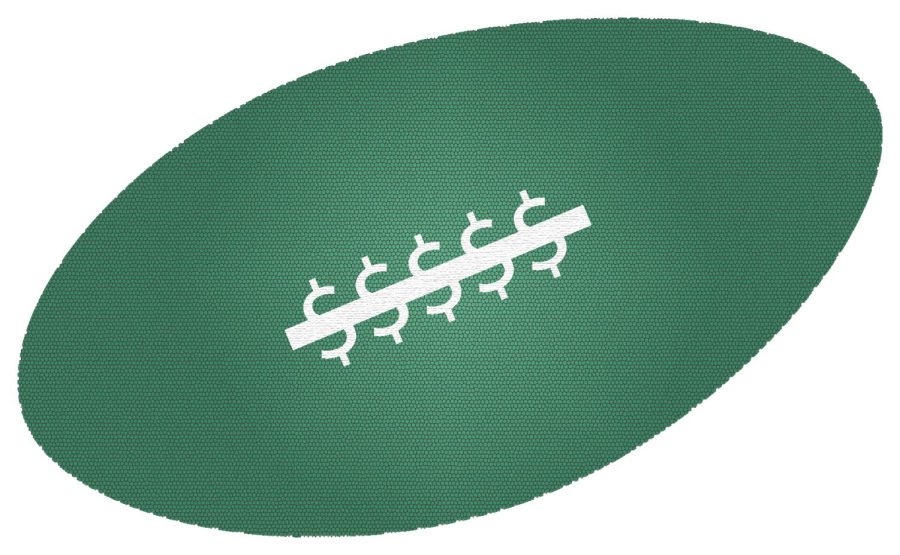Are Salaries Too High for College Football Coaches?
(Graphic by Claire Peterson | The Daily Utah Chronicle)
January 24, 2022
Payment in athletics is one of the most complex issues facing colleges today. Coaches and athletic directors are paid exorbitantly, but athletes are not allowed to have salaries so they can keep their amateur status.
Kyle Whittingham, head coach of the University of Utah football team, makes $5.2 million per year. At face value, this is a pretty astonishing salary for a University employee, which, at its heart, is a center for learning and preparing young adults for real life. However, I think this number is justifiable.
The Utah football program, outside of the pandemic season, makes profits exceeding $30 million per year. Whittingham is a huge part of that; without his contributions, it is doubtful that the Utes would be in the Pac-12. Being in the Pac-12 is more than an athletic upgrade and its membership includes perks that are not solely sports-related. This membership places the U on equal footing with prestigious schools such as USC, UCLA and Stanford, raising the U’s stock academically and athletically.
The way that one views the role of a football program for the school affects how one interprets this massive salary. If you view the football program independently from the school, then it seems like a solid financial investment to pay the coach handsomely. They bring in a big profit, and there is a lot of competition for successful coaches. A school has to offer a large salary to get the most sought-after coaches.
However, when in the context of the University, many would argue that it seems ridiculous that the highest-paid person at a school is unrelated to academics. That money could be going towards paying teachers higher salaries or any number of improvements directly related to learning.
What this argument fails to consider is the importance of a thriving athletic program for a university. It makes the school more enticing for prospective students and increases the notoriety of the university across the country. Having fantastic athletic programs that entice young, talented student-athletes to come play is excellent for the school as a whole and all the athletics at the U.
Football is the greatest profit-earner for athletics across campus. Excluding gymnastics, all other sports at the U lose money. The big profit that football makes helps cover the expenses for these programs. In this light, it makes sense that Whittingham should be highly compensated. He helped Utah football become extremely profitable.
Not all college coaches are responsible for successful programs. The most profitable college football program in the United States is Texas, and they haven’t had a coach that has been successful on the field in the last decade. This looks bad when looking at the athletes that put in massive amounts of work and receive no direct compensation.
Many student-athletes are awarded scholarships. The chance to attend a top-level school for free is extremely valuable. They can earn their education and if their athletic dreams are not realized they have a solid backbone to start their lives.
However, a student-athlete’s school experience is very different from most students’. Because of the pressures of Division 1 athletics, many student-athletes are forced to prioritize athletics over their schoolwork. Students’ performance in class can deteriorate and even become an afterthought.
For many athletes, especially in football, their athletic pursuit is their job. Officially, there is only supposed to be 20 hours of practice per week for these athletes, but a self-reported poll from Business Insider said football players were practicing over 40 hours per week. That is a full-time job.
Recently, a new rule was implemented in college athletics that is a great step towards creating a system that fairly compensates the amount of work athletes put toward their sports. College athletes can now monetize their name, image and likeness. This could mean getting paid to promote a brand on social media, or even making money from their jersey sales. I still think there is more to be done.
Players should never have to worry about money. One solution is student-athletes could be given a minimum wage salary to support themselves. The massive gap in compensation between coaches and athletes makes the salary of a coach appear especially inflated, but many coaches, such as Whittingham, are paid a fair salary for what they bring to the university.














patrick a shea • Jan 27, 2022 at 1:29 pm
Universities are not about profits. They are meant to teach and provide an arena for unbriddled research. And, $30 million pales in comparsion to how much money is brought to the University by winning research grants from government agencies and private donors, e.g. Huntsman Cancer Institute, Huntsman Mental Health Institute, the Gardner Center and many more. From the Government Grants the University is given an overhead dollars that can be as high as 48% of the grant.
I hope you will make the correction both about the “profit” and the largest revenue generator at the University. Pat Shea Private Attorney & Research Professor of Biology (ret.)
J • Jan 27, 2022 at 11:54 am
Bruh. Focusing too much on athletics is why buildings like the Stewart or Merrill building are actually falling apart, and why we can’t attract more professors we want. $53 million for the coach while TEACHING staff makes not even a sizable portion of that is why the U won’t climb the academic ranks anymore.